
Dactyloceras lucina is a species of very large moth of the family Brahmaeidae. It is found in central and west Africa, where it has been recorded from Equatorial Guinea, Ghana, Ivory Coast, Kenya, Sierra Leone, Uganda and Zambia. The species was first described by Dru Drury in 1782.

Ceretes thais is a moth in the Castniidae family. It is found in Brazil. Superficially it looks very like a butterfly, and was originally placed by Dru Drury in the "Papilio " group which mostly corresponds with modern Nymphalidae.

Brachyglene caenea is a moth of the family Notodontidae first described by Dru Drury in 1782. It is restricted to south-eastern Brazil, from Rio de Janeiro south to Santa Catarina.
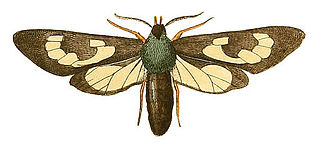
Cosmosoma fenestrata is a moth of the family Erebidae. It was described by Dru Drury in 1773. It is found on Jamaica and Cuba.
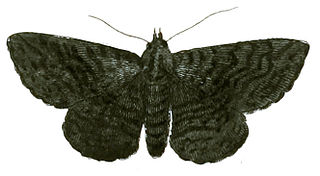
Zale undularis, the black zale moth, is a moth of the family Noctuidae. The species was first described by Dru Drury in 1773. It is found in the eastern United States and southern Ontario.
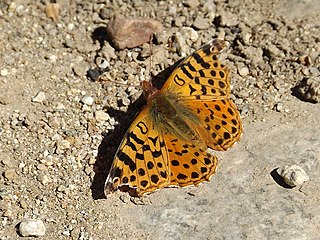
Yramea cytheris is a species of butterfly in the family Nymphalidae. It was first described by Dru Drury in 1773 from the Falkland Islands. In some systems it is included in genus Issoria.

Greta diaphanus, the Antillean clearwing, is a species of clearwing (ithomiine) butterflies, named by Dru Drury in 1773.

Pitthea famula is a species of moth in the family Geometridae. It was first described by Dru Drury in 1773 from Calabar, in what is now Nigeria. It is found in Angola, Benin, Cameroon, the Republic of the Congo, the Democratic Republic of the Congo, Equatorial Guinea (Bioko), Nigeria, Sierra Leone and Zambia.

Antheua servula is a species of moth of the family Notodontidae. It was first described by Dru Drury in 1773 from Madras. It is also found in other parts of India, Sri Lanka and on Sumatra.

Imbrasia epimethea is a species of moth belonging to the family Saturniidae. It was first described by Dru Drury in 1773 from the Calabar coast.

Crameria is a monotypic moth genus in the family Noctuidae erected by Jacob Hübner in 1819. Its only species, Crameria amabilis, was first described by Dru Drury in 1773.

Lucinia cadma is a species of brush-footed butterfly. It was first described by Dru Drury in 1773 from Jamaica. Distinct subspecies are found on other Caribbean islands.

Otroeda cafra is a species of moth in the tussock-moth subfamily Lymantriinae. It was first described by Dru Drury in 1782 from Sierra Leone, and is also found in Cameroon, DR Congo, Malawi, and Nigeria.

Otroeda nerina is a species of moth in the tussock-moth subfamily Lymantriinae. It was first described by Dru Drury in 1782 from Sierra Leone, and is also found in Cameroon, DR Congo, Gabon, Ghana and Nigeria.

Panara jarbas is a species in the butterfly family Riodinidae found in Brazil. It was first described by Dru Drury in 1782.

Pseudobunaea alinda is a species of very large moths in the family Saturniidae. The species was first described by Dru Drury in 1782, and is found in Angola, Cameroon, Congo, DR Congo, Gabon, Guinea, Ivory Coast, Sierra Leone, and Tanzania.
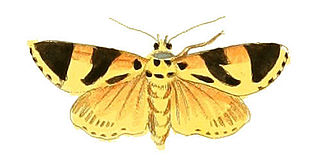
Attatha ino is a species of moth of the family Noctuidae. It was described by Dru Drury in 1782 from "Madras".
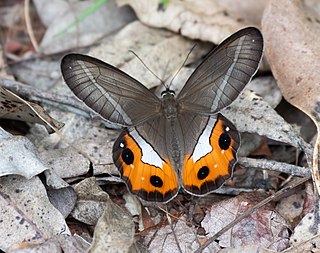
Pierella nereis is a butterfly species from the subfamily Satyrinae in the family Nymphalidae. It was first described by Dru Drury in 1782 from Brazil.

Heliconius sapho, the Sapho longwing, is a butterfly of the family Nymphalidae. It was described by Dru Drury in 1782. It is found from Mexico southward to Ecuador.
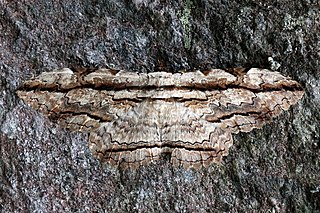
Thysania zenobia, the owl moth, is a species of moth in the family Erebidae. The species was first described by Pieter Cramer in 1776, and is native to North and South America and the Caribbean.


















